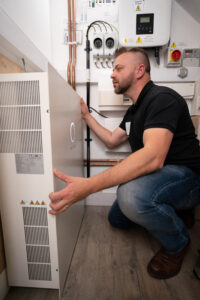A Guide to Becoming MCS Certified
31 July 2023

MCS is a standards organisation and quality assurance scheme. MCS certifies low-carbon energy technologies and installations used to produce electricity and heat from renewable sources. This includes heat pumps, solar panels, battery storage, biomass and wind.
There are currently over 3,500 MCS certified installers, who are responsible for over 1.6 million MCS certified installations across the UK. Being an MCS certified installer demonstrates to your customers that you install to the industry-expected level of quality every time. MCS gives you a mark of quality which provides assurance.
As renewable technologies are becoming the ‘new normal’, more homeowners are looking for MCS certified installers to install their solar panels, heat pumps and other low-carbon energy technologies.
Becoming MCS certified can help you grow your business and strengthen your reputation as an installer.
How do you become MCS certified? Here’s a guide to what you need to know about gaining certification for your company.
1 – Familiarise yourself with the Standards
To become an MCS certified installer, you will need to be assessed against the MCS 001 Standard and the specific technical Standard for the technology you wish to become certified for. Installer standards are available here. It is important to familiarise yourself with the appropriate Standards and be able to demonstrate how your company complies with their requirements.
2 – Demonstrate Competency
In order to gain MCS certification, your company will be asked to demonstrate how you engage the services of skilled, competent, and experienced individuals to fulfil each activity required to meet and maintain the requirements of the Scheme.
MCS has outlined the full competency criteria that is needed to join the Scheme and maintain compliance. You will find this in the MCS 025 Standard.
MCS 025 explains how you will need to identify at least one individual in your company who can act as your Nominated Technical Person (NTP) for each technology you are looking to install. The best way to demonstrate the competency of your chosen NTP is to evidence that they have successfully completed an MCS approved training course, appropriate to the technology being installed.
You can find MCS approved training courses here.
3 – Commit to demonstrating quality
Demonstrate the operation of a Quality Management System (QMS).
A common misconception is that a QMS must be a long and complicated document. Another is that you need to pay for a software service. This is not the case. Your QMS should be fit for purpose and proportionate to the size of your business, providing evidence of how you manage the quality of all of your installations.
4 – A Commitment to Customer Care
Join a Consumer Code. This Consumer Code must be approved by the Chartered Trading Standards Institute (CTSI). There are two Consumer Codes available to join in relation to MCS:
- Renewable Energy Consumer Code (RECC), or;
- Home Insulation & Energy Systems Quality Assured Contractors Scheme (HIES)
The choice of which Consumer Code you subscribe to is yours. It is recommended to contact both to establish the best fit for your organisation and compare costs and onboarding timelines.
Membership of a Consumer Code shows that you are committed to complying with a high standard of consumer service and protection.
5 – A Commitment to Quality Workmanship
Apply to a Certification Body. A Certification Body will ensure that you install the renewable technology in line with the MCS Standards. They will assess your company in terms of company practices and perform an inspection of an installation site that you nominate.
Your choice of Certification Body will depend on your individual requirements but will likely be influenced by the services the Certification Body has to offer, whether they can provide MCS certification for the technologies you wish to install, and if you have an existing relationship with them. The Certification Body you choose will guide you through the certification process.
All of the Certification Bodies have different prices for becoming certified, and timescales can also differ for the assessment. A list of Certification Bodies that offer MCS certification can be found here.
How much does it cost to become MCS certified?
| Type of Cost | Year 1 | Ongoing |
| Consumer Code (* based on RECC figures) | £100.00 joining fee + membership fee (based on number of employees), e.g. £285.00 (1-6 employees) = £385.00 | £285.00 (based on 1-6 employees) |
| Certification Body (average – per technology) | £650.00 | £550.00 |
| MCS | £55.00 (per company) | £55.00 (per company) |
| MCS Certificate | £30.00 (per installation) | £30.00 (per installation) |
| TOTAL: | £1,090.00 + certificates | £890.00 + certificates |
* HIES fees are currently advertised as £695 +VAT
MCS is an industry-led quality assurance scheme, which demonstrates the quality and reliability of approved products and installation companies.
Being MCS certified demonstrates to your customers that you install/manufacture to the industry-expected level of quality every time. MCS gives you a mark of quality which provides assurance.
or call the MCS Helpdesk on 0333 103 8130 for more information on how to become certified.
